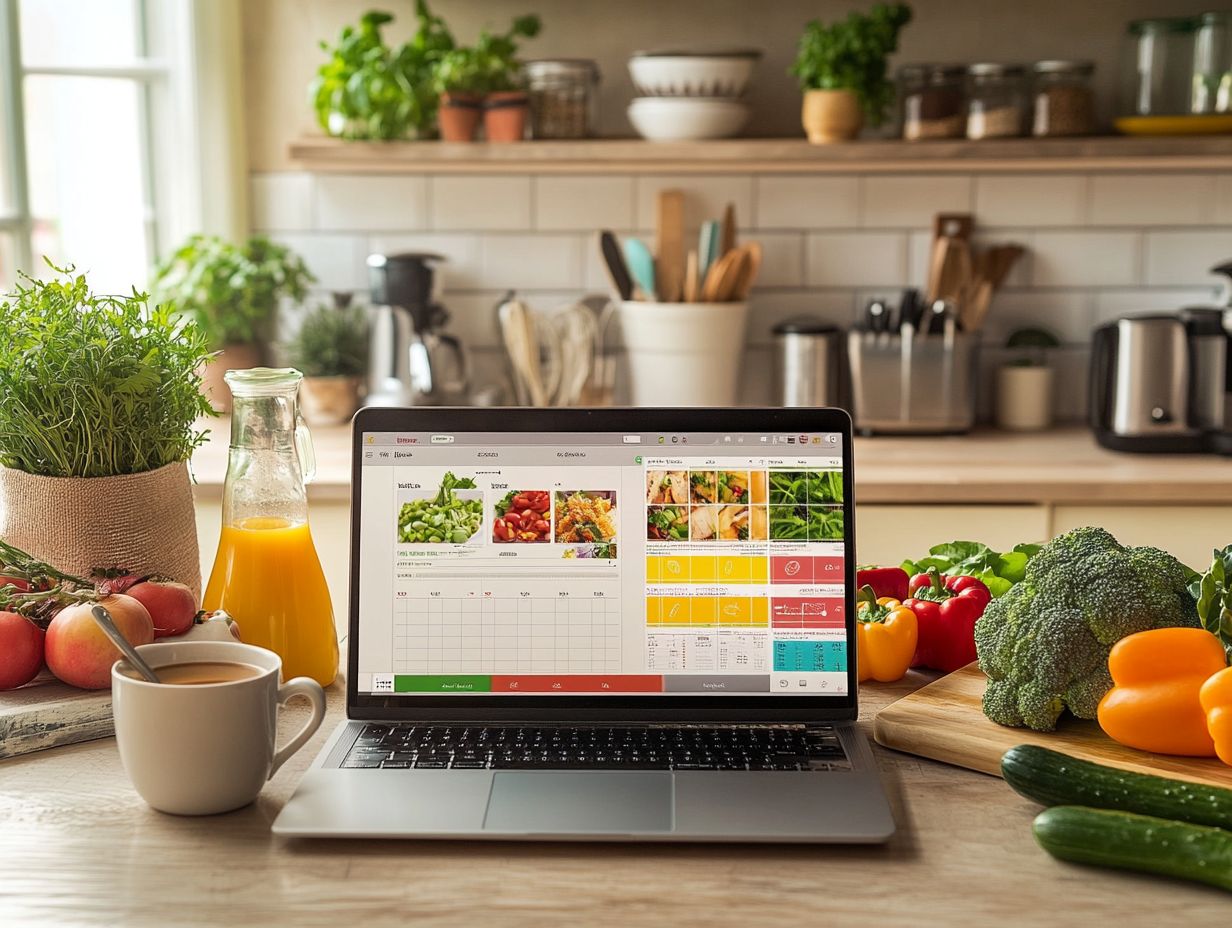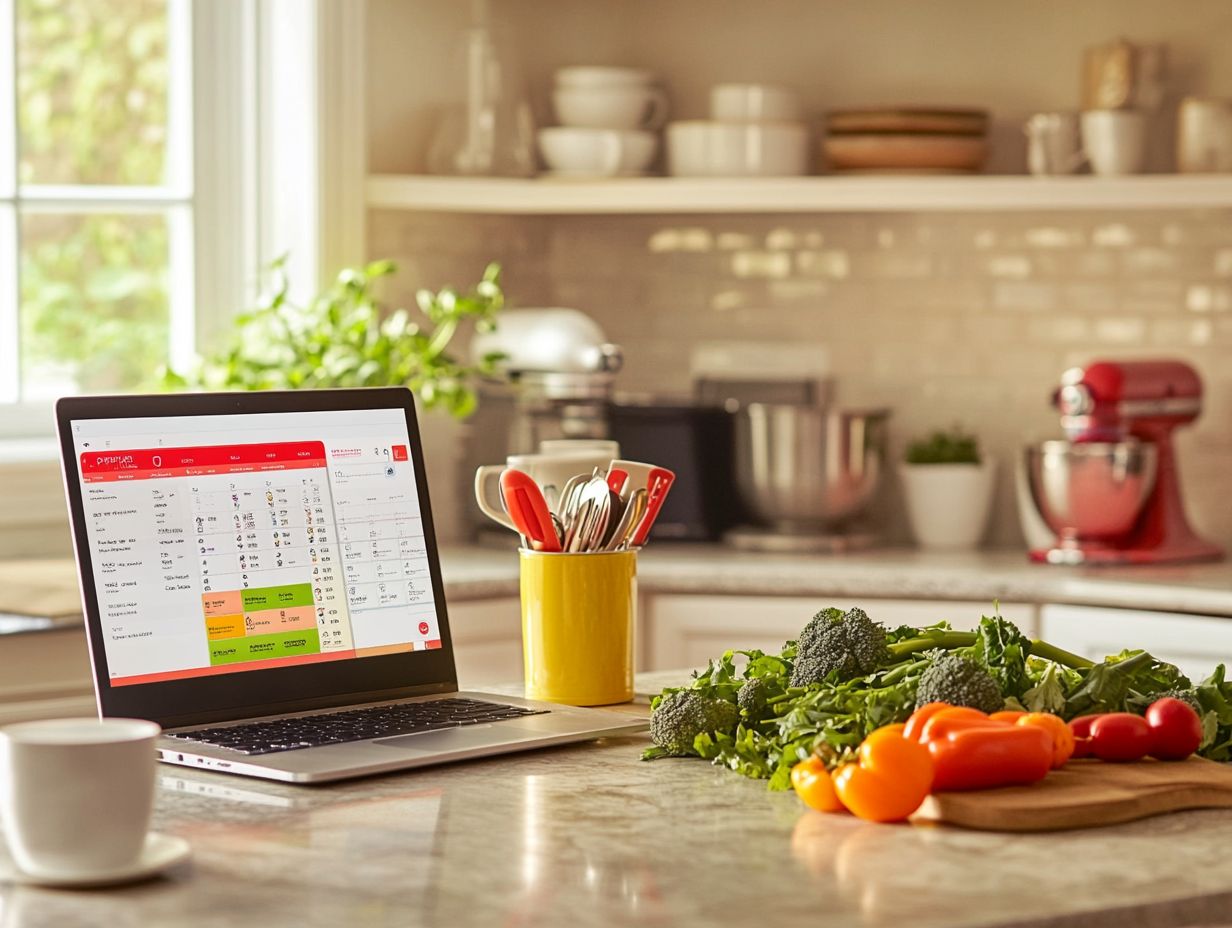7 Common Meal Planning Mistakes to Avoid
Meal planning will transform your approach to healthier eating, time management, and budgeting.
However, many individuals fall into common traps that can undermine their best intentions. Ignoring dietary restrictions or neglecting personal preferences can lead to frustration and wasted resources.
This article explores seven common meal planning pitfalls to avoid. We will also highlight the advantages of effective meal strategies and offer tips for crafting a balanced plan tailored to your lifestyle.
Start your meal planning journey today and discover how to elevate your culinary experience!
Contents
- Key Takeaways:
- 1. Not Taking Dietary Restrictions into Account
- 2. Not Considering Budget
- 3. Not Planning for Leftovers
- 4. Not Varying Meals
- 5. Not Checking for Seasonal Produce
- 6. Not Factoring in Time Constraints
- 7. Not Taking Individual Preferences into Account
- How Can Meal Planning Help with Healthy Eating?
- Frequently Asked Questions
- 1. What are the 7 common meal planning mistakes to avoid?
- 2. How does not having a plan affect meal planning?
- 3. Why is it important to consider your schedule when meal planning?
- 4. How can incorporating variety improve meal planning?
- 5. What should be done with leftovers when meal planning?
- 6. How can checking for ingredients on hand improve meal planning?
Key Takeaways:

Remember to consider dietary restrictions to make meals enjoyable for everyone.
Keep a budget in mind while planning meals to avoid overspending.
Plan for leftovers to save time, money, and reduce food waste.
1. Not Taking Dietary Restrictions into Account
When meal prepping, neglecting dietary restrictions can ruin family dinners and hinder health goals. Consider allergies and preferences to create inclusive meals.
By recognizing diverse dietary requirements whether due to allergies, intolerances, or personal choices you create a more inclusive dining experience. This thoughtful approach ensures that everyone at the table enjoys their meal and promotes overall well-being.
Meal planning is your secret weapon in this endeavor, allowing you to prepare personalized dishes that address each family member’s unique needs. With strategic planning, you can minimize food waste by effectively utilizing all ingredients, marrying deliciousness with health goals.
Through these practices, you can achieve a harmonious balance between nourishment and enjoyment for your family.
2. Not Considering Budget
Ignoring your budget while meal planning can lead to overspending and unnecessary food waste, ultimately undermining the effectiveness of your meal prep and making it tougher to stick to healthy eating habits.
To avoid these pitfalls, craft a well-structured grocery list that respects your financial limits while encouraging nutritious choices.
Start by evaluating what ingredients you already have at home. Utilizing pantry staples can save you money and minimize waste. Incorporate affordable protein sources, like legumes, eggs, and canned fish, into your meals to stretch your budget even further.
Planning meals around seasonal produce can also lead to substantial savings. By balancing variety and cost-effectiveness, you can transform grocery shopping from a source of stress into an opportunity for healthier living.
3. Not Planning for Leftovers
Not planning for leftovers wastes food and misses opportunities for quick, healthy snacks. This ultimately reduces the potential of batch cooking to provide meal variety for busy families.
By incorporating leftovers into your weekly meal prep, you can enhance kitchen organization and significantly cut down on food waste. This strategic approach opens the door to creative culinary improvisation, transforming yesterday s meals into exciting new dishes.
For instance, yesterday’s roasted vegetables can be effortlessly blended into a delightful frittata or tossed into a hearty grain bowl.
Using meal containers effectively keeps everything neatly categorized and accessible, inspiring your family to embrace the magic of leftovers while ensuring that no delicious morsel goes unappreciated.
4. Not Varying Meals
Eating the same meals can get boring and lead to disinterest in healthy eating. It s crucial to incorporate different cooking techniques and meal rotation strategies to keep family meals vibrant and enjoyable.
Exploring a range of flavors and textures not only sparks interest but also helps ensure a balanced intake of nutrients. By emphasizing seasonal produce, you infuse your meals with freshness and vibrancy, encouraging creativity in the kitchen.
For instance, swapping out ingredients based on what s fresh at local markets opens up exciting opportunities to experiment with new dishes.
Involving your entire family in the recipe selection process fosters a sense of ownership and excitement around meal prep. From choosing recipes to shopping for ingredients, this collaboration transforms healthy eating into a shared adventure, turning mealtime from a mundane task into an engaging experience.
5. Not Checking for Seasonal Produce

Overlooking seasonal produce not only stifles the flavor and freshness of your meals but also diminishes your grocery shopping experience. This can lead to unnecessary food waste.
When you embrace the bounty of seasonal vegetables, you unlock a treasure trove of flavors that reach their peak at specific times throughout the year. The nutritional value of these fresh ingredients is significantly heightened, as they are harvested at their ripest, ensuring a richer concentration of vitamins and minerals.
This not only helps you make healthier meals but also sparks creativity in your cooking adventures. Aligning your cooking methods with what s in season transforms meal prep into an enjoyable adventure. You can optimize techniques like roasting, steaming, or saut ing to bring out the best in each ingredient.
With every recipe, you cultivate a newfound appreciation for the diversity and richness that seasonal eating brings to your table.
6. Not Factoring in Time Constraints
Disregarding time constraints when planning your meals can lead to unnecessary stress and unhealthy eating choices. This highlights the importance of effective time management and taking advantage of meal prep services to simplify the cooking process.
By embracing time-saving techniques like batch cooking making large portions at once you can prepare large quantities of ingredients ahead of time, making swift meal assembly a breeze during your busy week. Efficient kitchen tools like food processors and pressure cookers further enhance this process, cutting down cooking times and minimizing effort.
Understanding the varying cooking times and skill levels among your family members allows you to choose recipes that are both quick to prepare and nutritious. This strategic approach not only promotes healthier eating but can also transform meal preparation into a fun, collective family activity.
7. Not Taking Individual Preferences into Account
Ignoring individual preferences in meal prep can lead to unappetizing family dinners, making it essential for you to involve your family members in customizing meals. This way, you can create balanced dishes and healthy snacks that cater to everyone’s tastes.
This approach lets each member share their favorite flavors, dietary restrictions, and cherished family recipes. Inviting your family to share their ideas transforms the selection process into a collaborative and enjoyable experience.
Encouraging everyone to suggest recipes not only helps meet diverse nutritional needs but also fosters a sense of ownership over the meals prepared. When each person contributes to the planning, the final dishes are much more likely to delight every palate, turning mealtime into a cherished family gathering rather than just another routine obligation.
How Can Meal Planning Help with Healthy Eating?
Meal planning is your secret weapon for promoting healthy eating. It enables you to plan your meals, minimize food waste, and ensure you consistently enjoy balanced dishes that align with your health goals.
With meticulous preparation techniques, you can elevate your dining experience, transforming cooking into an enjoyable ritual rather than a chore.
Thoughtful grocery shopping like crafting a list and sticking to it encourages you to make nutritious and delightful selections, enabling you to make informed choices that benefit both your palate and your well-being.
Meal prep services can easily fit into your busy life, making cooking a breeze! This approach caters to your specific dietary needs, offering options that not only tantalize your taste buds but also enhance flavors through carefully curated recipes.
Ultimately, this transformation goes beyond just eating; it enriches your relationship with food itself. Start meal planning today to take control of your health and delight in delicious meals!
What Are the Benefits of Meal Planning?
Meal planning provides many advantages. These include better food management, less waste, and improved healthy eating habits.
By mastering meal prep, you can unlock significant cost savings. Buying ingredients in bulk often means lower expenses. This approach not only helps you stay within budget but also frees up valuable time during the week, making your cooking experience far more enjoyable.
With meals prepared in advance, you can easily cater to any dietary requirements, ensuring that everyone at the table savors wholesome, nutritious options. For instance, your family can tailor meal plans to accommodate vegetarian, gluten-free, or low-carb preferences, enhancing the overall dining experience.
Ultimately, meal prep encourages healthier choices that benefit both your physical well-being and family togetherness during mealtime.
How Can One Create a Balanced Meal Plan?

Creating a balanced meal plan requires you to select meal components with care, taking dietary requirements into account and employing various cooking methods to achieve a diverse and nutritious diet.
This means you should pay attention to key nutrients. Include good protein sources like beans, lean meats, or plant-based options to support your energy levels.
It s equally important to incorporate a vibrant array of vegetables. These not only elevate the visual appeal of your plate but also provide essential vitamins and minerals vital for long-term health.
Don t forget about healthy snacks between meals; options like nuts, yogurt, or fresh fruit can help you maintain energy and avoid the temptation to overeat.
Customization is key; you should feel enabled to adjust flavors, portion sizes, and ingredients to align with your personal tastes and specific dietary goals, whether you’re aiming for weight loss, muscle gain, or simply a more vibrant lifestyle.
What Are Some Tips for Successful Meal Planning?
Successful meal planning hinges on effective cooking strategies, meticulous kitchen organization, and thoughtful grocery shopping. This trifecta streamlines food preparation and enhances your overall cooking experience.
By crafting a comprehensive grocery list, you ensure that you purchase only what you truly need, which curbs impulse buying and significantly reduces food waste. Organizing your pantry maximizes space and allows you to locate ingredients swiftly, making meal prep a breeze.
Incorporating time-saving techniques, like batch cooking or prepping meals in advance, can significantly reduce your cooking time, transforming the culinary process into a more enjoyable endeavor.
These strategies also lead to healthier eating habits, encouraging the consumption of fresh, home-cooked meals while nurturing a mindset focused on mindful food management.
How Can Meal Planning Save Time and Money?
Effective meal planning can be a game-changer! It saves you both time and money while keeping your meals healthy and balanced.
By organizing your meals in advance, you can craft a well-thought-out grocery list that focuses solely on the ingredients you truly need, steering you clear of unnecessary purchases. Embracing batch cooking techniques also simplifies the process of preparing multiple meals in one go, cutting down on your daily cooking time.
Plus, using meal containers for storage enhances accessibility and encourages healthier eating by keeping nutritious options readily available. Committing to a meal plan enables you to make smarter purchasing decisions, keeping those impulse buys in check.
Over time, this intentional approach can lead to substantial cost savings. Start today, and watch your savings grow while enjoying delicious meals!
What Are Some Common Myths About Meal Planning?
Many myths surround meal planning. Some people think it s too time-consuming or limits meal variety.
In reality, meal planning can fit easily into your schedule. This allows you to save time during busy weekdays.
Spending just a few hours weekly on meal prep simplifies grocery shopping. It also reduces food waste by using ingredients efficiently.
Meal planning is flexible and can cater to various diets. Whether you re vegetarian, gluten-free, or aiming for a healthier lifestyle, it works for you.
This strategy lets you personalize meals. You can explore different flavors and keep your diet exciting.
Frequently Asked Questions
1. What are the 7 common meal planning mistakes to avoid?

Avoid these mistakes: not planning, ignoring your schedule, lacking meal variety, overlooking leftovers, forgetting to check your pantry, not sticking to your budget, and neglecting personal preferences.
2. How does not having a plan affect meal planning?
Without a plan, you might make unhealthy choices or end up buying too much food, leading to waste.
3. Why is it important to consider your schedule when meal planning?
Considering your schedule helps you choose meals that are easy to prepare. This prevents the temptation to grab fast food.
4. How can incorporating variety improve meal planning?
Adding variety ensures a balanced and nutritious diet. It also keeps meals interesting and enjoyable.
5. What should be done with leftovers when meal planning?
Plan to use leftovers in your next meal. This reduces waste and saves you time and money.
6. How can checking for ingredients on hand improve meal planning?
Checking your pantry helps avoid unnecessary shopping. It allows you to use what you already have, saving time and money.




